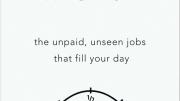Craig Lambert ’69, Ph.D. ’78, retired as Harvard Magazine’s deputy editor (a real job) late last year and promptly turned his energies to completing his second book (another real job). Shadow Work: The Unpaid, Unseen Jobs That Fill Your Day (Counterpoint, $26) is published today.
As the subtitle suggests, it explores the labor that has been transferred to people who used to consider themselves customers. As Lambert publicizes his book, for instance, he can expect to become his own travel agent: reserving flights, trains, and hotels online; printing boarding passes; schlepping luggage; filling cars with gasoline at the pump; etc. (At the magazine, which used to send columns of type off to the printer on waxed paper, the staff today composes entire pages electronically, places photographs and illustrations, and transmits entire files to the printer’s website; the work has been, technologically, moved upstream.)
Customers clearly find some of this transfer of effort efficient and useful: it is easier to find lots of products on line via Amazon and other vendors than in stores; and much less vexing to have those items delivered than to drive through suburban traffic, find a parking space, trudge through a mall, perhaps find the wanted item or a salesperson who knows where to find it, and complete a purchase.
But much of the transfer represents outsourcing that is financially advantageous for supplier and provider companies—and completely burdensome for the rest of us. From the introduction:
Life has become busier. Somehow there seems to be less time in the day, although days remain indisputable twenty-four hours long. In truth, time isn’t vanishing, only free time is. How can this be? We are living in the most prosperous era in human history, and prosperity supposedly brings leisure. Yet, quietly, subtly, even furtively, new tasks have infiltrated our days, nibbling off bits of free time like the sea eroding sand from the beach. We find ourselves doing a stack of jobs we never volunteered for, chores that showed up in our lives below the scan of awareness. They are the incoming tidal wave of shadow work.
Shadow work includes all the unpaid tasks we do on behalf of businesses and organizations. Most of us do not recognize it or realize how much of it we are doing, even as we pump our own gas, scan and bag our own groceries, execute our own stock trades, and assemble our Ikea furniture. Scores of shadow tasks have infiltrated our daily routines, settling in as habits as we drive our kids to school or make our lunch at the salad bar. We are not slaves in ancient Greece or peasants in medieval Europe, but nonetheless we are working for nothing. Shadow work has introduced a new element to the modern lifestyle: middle-class serfdom.
Read more about Shadow Work in the forthcoming New York Times Book Review, ‘Rise of the Robots’ and ‘Shadow Work.’








